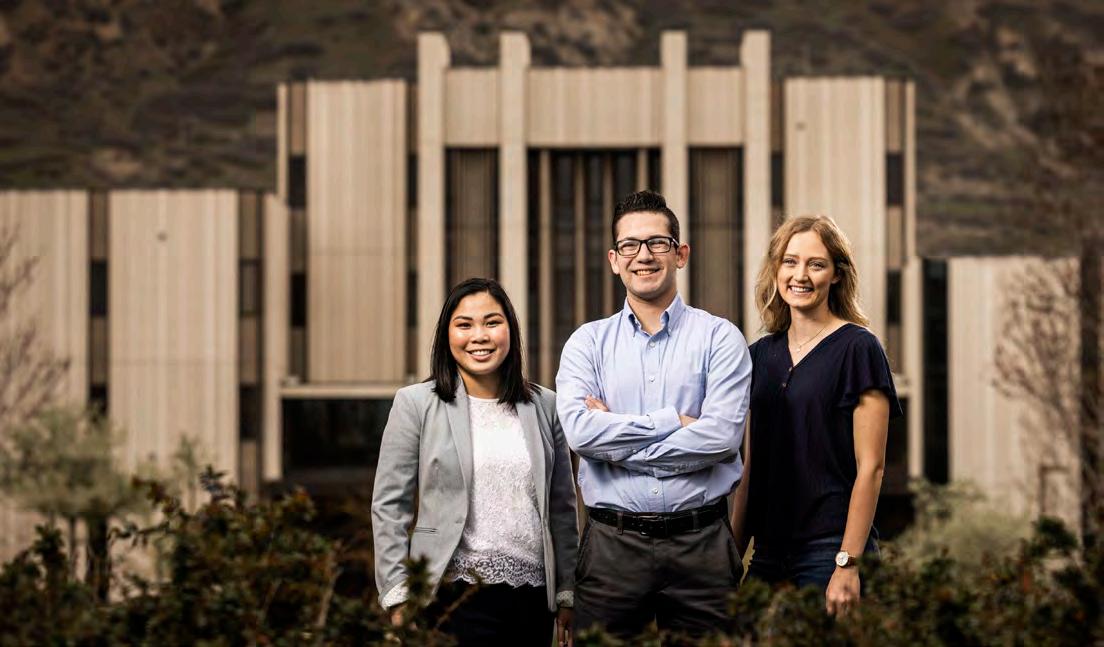

we are privileged to participate in this great venture. it is our duty to make it great.
DALLIN H. OAKS | AUGUST 27, 1973



we are privileged to participate in this great venture. it is our duty to make it great.
DALLIN H. OAKS | AUGUST 27, 1973
There is much speculation as to who first proposed the idea of byu Law School, but certainly Marion G. Romney, senior member of the Quorum of the Twelve Apostles, and byu president Ernest L. Wilkinson were instrumental in the process that led the byu board of trustees to announce the establishment of the Law School on March 9, 1971. The announcement immediately sparked concern over how Utah could possibly sustain a second law school and generated a flurry of debate (both public and private) on how the new school would reflect its sponsor, The Church of Jesus Christ of Latter-day Saints.

The ap pointment of key leaders would soon define the character of the school and chart its auspicious path. The commissioner of the newly formed Church Educational System, Neal A. Maxwell, an intellectual with an appreciation for scholarly work, was influential in the appointment of Dallin H. Oaks, a legal scholar and professor of law at the University of Chicago, as byu’s new president. President Oaks’s gravitas was essential to rallying acceptance of the new school.
A selection committee was tasked with finding the Law School’s first dean—someone who would set the tone, attract top-quality faculty and students, and forge the school’s reputation from its inception. They found the energetic and magnetic Rex E. Lee. Of all the tasks Lee faced in November 1971, his paramount concern was recruiting faculty. He recalled,
Everything hinged on the kind of people making up the team on that opening day. They would be important not only for that year; they would also affect the quality of faculty and students we would have for years to come. They were the key to our success.1
Lee pursued prospects tirelessly, and he eventually enticed a group of extraordinary, brave academics to give up their law practices and faculty positions at other schools and move to Provo. The initial faculty included Lee, President Oaks, Woodruff J. Deem, Bruce C. Hafen, Carl S. Hawkins, Edward L. Kimball, David Lloyd, C. Keith Rooker, and Dale A. Whitman. Lee’s next priority was convincing prospective students—many of whom could have gone to any law school—to take a risk and join the charter class. Faculty and students were gathered; now they needed a place to teach and learn.
On May 1, 1973, rain showered down as Lee manned a loader with President Oaks and apostle Ezra Taft Benson as passengers. Lee broke the asphalt in the Wilkinson Center parking lot, and each of them turned a ceremonial shovelful of dirt. Construction of the law building had begun. In the meantime, the St. Francis School on 9th East and 3rd North in Provo provided temporary quarters nicknamed “St. Reuben’s.”
The Law School’s opening ceremony took place on August 27, 1973, in the Pardoe Theatre of byu’s Harris Fine Arts Center. President Romney articulated the Law School’s mission: To provide an institution “in which [students] may obtain a knowledge of the laws of man in the light of the laws of God.”2 President Oaks’s remarks also set high expectations for the school:
We are privileged to participate in this great venture. It is our duty to make it great. . . . . . . [It] must attain a greatness that transcends religious lines and establishes itself in the eyes of legal educators, scholars, the judiciary, the legal profession, the business world, officials of local, state, and federal government, and citizens at large.3
Few in attendance could have imagined that the Law School would meet this high bar so resoundingly.
The iconic byu Law School building was dedicated on September 5, 1975. Not one but two Supreme Court Justices—Chief Justice Warren E. Burger and Associate Justice Lewis F. Powell Jr.—were in attendance. Justice Burger’s dedication address lauded the school’s unique ability to “[fill] a significant need in the legal education of this country,” and he predicted that the school would “become one of the foremost in the country.”4 The ceremony
itself evidenced something historic and inspired students and faculty to fulfill the founders’ ambitious vision. The Law School has maintained a trajectory of increasing renown and influence ever since.
notes
1 Rex E. Lee, “Thoughts After 15 Years,” Clark Memorandum, Spring 1990, 14.
2 Marion G. Romney, untitled address delivered at the opening ceremony of the J. Reuben Clark Law School in Provo, Utah, on August 27, 1973; in Addresses at the Ceremony Opening the J. Reuben Clark Law School (August 27, 1973), 20.
3 Dallin H. Oaks, untitled address delivered at the opening ceremony of the J. Reuben Clark Law School in Provo, Utah, on August 27, 1973; in Addresses at the Ceremony Opening, 5, 7.
4 Warren E. Burger, “The Role of the Lawyer in Modern Society,” address delivered at the dedication of the J. Reuben Clark Law School in Provo, Utah, on September 5, 1975, in Brigham Young University Studies 16, no. 4 (Summer 1976): 501–2.
because of the exams. These students wondered whether they would even be permitted to take the bar examination after graduation. byu Law had not yet been accredited by the American Bar Association (aba), and there were rumors of national opposition to the accreditation. Faculty who left tenured positions at accredited schools or relinquished successful law practices faced the possibility that they had made a grave career misstep. To make matters worse, the sizeable financial investment in the new school was also in jeopardy.

These risks were real. The Law School’s compliance with aba standards governing the quality of faculty, students, curriculum, and library was certain and the Law School’s financial resources and physical facilities were beyond reproach—but the aba was unsettled by byu’s Honor Code and its practice of charging higher tuition to students who weren’t Latter-day Saints. Compliance with the aba’s equal opportunity standard, which prohibited law schools from discrimination based on “race, color, religion, national origin, or sex,” was up for debate.
The Law School submitted a brief explaining its position that the tuition differential was not a form of religious discrimination but rather, like in-state tuition at state universities, a disparity rationally based on financial contributions Latter-day Saint students made to byu through tithes. It also argued that byu’s Honor Code did not require belief in any particular religion but rather imposed a code of conduct on all students and faculty based on ethical and moral principles. The brief concluded that construing the aba standard to prohibit these practices violated the constitutional right to freedom of religion.
On July 24, 1976, after a close vote in byu’s favor on the tuition issue, the aba recommended full accreditation of the Law School. The recommendation was unanimously approved in February 1977.
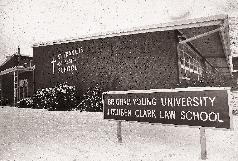
The school’s namesake, J. Reuben Clark Jr., studied law at Columbia University and was admitted to the New York Bar after his second year. Three months after Clark graduated in 1906, President Theodore Roosevelt appointed him assistant solicitor to the State Department. In 1910, Clark became solicitor to the State Department under President William Howard Taft. President Calvin Coolidge appointed Clark undersecretary of state in 1928 and then ambassador to Mexico in 1930, a position he held until 1933 when he was sustained as second counselor to President Heber J. Grant in the First Presidency of The Church of Jesus Christ of Latter-day Saints.


The 36-year-old Arizona lawyer was not an obvious choice for byu Law’s first dean, despite graduating at the top of his class at the University of Chicago Law School and clerking for Supreme Court Justice Byron R. White. Upon receiving a callback for a second interview, Rex E. Lee was dismayed that the search committee appeared to be seriously considering him for the job. He recalled at a Law School fireside in September 1988, “I didn’t think that there were enough [Latter-day Saint] academics and practitioners who could make good academics to fill up a decent faculty. I didn’t think there were enough students to fill up a first class. . . . I was just beginning to learn how to be a lawyer and I knew nothing about how a law school was supposed to function. But . I knew that this was the kind of thing that if I was asked to do, I couldn’t turn down.”
The groundbreaking ceremony for the new Law School building was held in the parking lot east of the Wilkinson Center on a frigid, windy spring day. Speakers included Elder Ezra Taft Benson, byu president Dallin H. Oaks, and dean Rex E. Lee, who all climbed into a loader as it made the first excavation.
byu Law classes began at the former St. Francis of Assisi School (affectionately nicknamed “St. Reuben’s” by the law students) after an initial opening ceremony in the Pardoe Drama Theatre of the Harris Fine Arts Center. At the ceremony, byu president Dallin H. Oaks charged the founding faculty and staff and the charter class of the Law School to “make it great.”

Dedication
Dedication attendees included United States Chief Justice Warren E. Burger and Associate Justice Lewis F. Powell Jr. In his dedicatory address, President Marion G. Romney shared his enthusiasm for the Law School: “I have long felt that no branch of learning is more important to an individual or to society than law. I further felt that the educational base at Brigham Young University— the flagship of our Church educational system—would be and should be broadened by the establishment of a law school.”
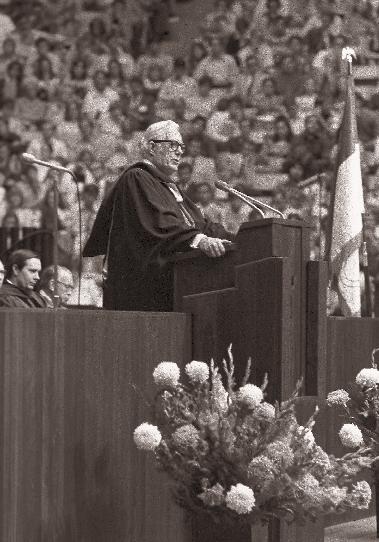
Supreme Court Clerks
byu Law has placed 15 Supreme Court law clerks since Monte Stewart in 1977. Most recently, James Lee was appointed as a clerk for Justice Samuel A. Alito Jr. for the October 2023 term. byu Law’s Clerkship Committee has been instrumental in securing prestigious and competitive federal clerkships for students.
Clark Memorandum

Professor Gerald Williams oversaw the installation of a leading-edge computer at byu Law, which paved the way for the West Publishing Company to hold a conference on law school computing at the Law School in 1984. byu Law turned into a recognized technological leader, and staff at the Law Library pioneered the automated card catalog. Early interest in the use of computing at the Law School began in 1979 with the introduction of the Computer-Assisted Practice Systems (caps) project. Conceived by professors Stanley Neeleman and Larry Farmer, caps reduced the time required to prepare legal documents by 80 percent. Its successor, HotDocs, now dominates the document automation software industry.
Charter class member Paul Warner founded the Clark Memorandum and became its first editor-in-chief. “It was not the slick publication it is today,” he recalls. “It was a newspaper back then, and we had a lot of fun with it.” First published in fall 1978, the Clark Memorandum magazine eventually became the official, biannual publication of the newly formed J. Reuben Clark Law Society in the fall of 1988. The magazine features information about the Law School and the activities of faculty and alumni. It also shares ideas of interest to all lawyers whose professional and personal aspirations are consistent with both the mission of byu Law and the values of The Church of Jesus Christ of Latter-day Saints.


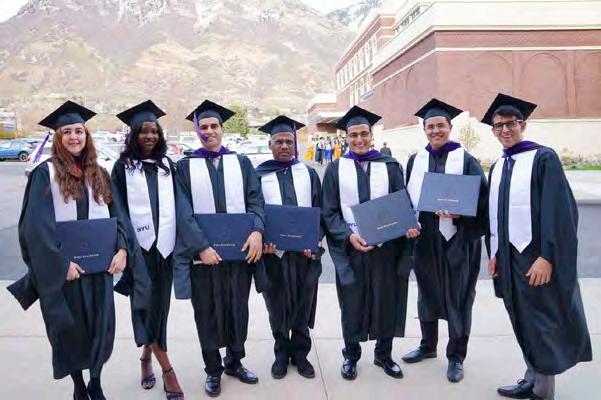
In 1975, Washington, DC, attorney Ralph W. Hardy Jr. attended the Law School dedication. “It was for me an epiphany,” he recalls. “I gradually began to think about this wider group of Latter-day Saint lawyers and how their association together could be a positive development both in their practice of law and for the Church.” Hardy nurtured the idea of a law society for more than a decade and in 1987 proposed the idea to byu Law dean Bruce C. Hafen, who embraced it. The J. Reuben Clark Law Society was formally organized in the fall of 1988 and today has over 10,000 members in more than 30 countries.
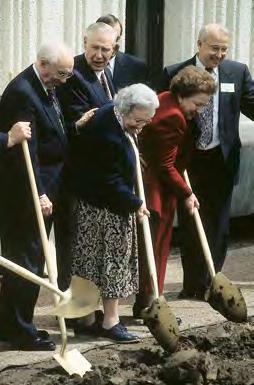
The World Family Policy Center (wfpc) was formed as a branch of the Law School in 1999. The organization expounded upon a speech given by Richard G. Wilkins, the wfpc’s founder and only director, at a United Nations conference in Istanbul, Turkey, in 1996. The primary goals of the wfpc were to strengthen the family as the basic unit of society and to guide the United Nations in moral lawmaking practices.
The International Center for Law and Religion Studies (iclrs) promotes freedom of religion and freedom of belief throughout the world. Built on the extensive efforts of byu Law faculty and their contacts, iclrs has achieved international stature as an academic base for long-term initiatives at the intersection of law and religion. iclrs is a recognized leader in the field of religious rights, both in the US and internationally. In the US, members of iclrs have given congressional testimony in support of draft legislation and participated in numerous conferences. Internationally, iclrs is instrumental in organizing 20 to 30 regional conferences and law reform consultations each year in countries around the world, including Chile, the Democratic Republic of the Congo, the Dominican Republic, Kazakhstan, Mongolia, Peru, the Philippines, and Sudan.
Corpus Linguistics byu Law is pioneering the study of law and corpus linguistics, a burgeoning new methodology for understanding the meaning of words by analyzing naturally occurring language patterns in large collections of texts called corpora. byu Law created the first course on law and corpus linguistics in the United States, and its Law and Corpus Linguistics project continues to develop new legal research corpora and foster influential scholarship using this method. The Law School’s annual Law and Corpus Linguistics Conference brings together prominent legal scholars, corpus linguists, and judges who have employed corpus linguistics analysis in their decisions. The conference has led to new academic publications, government policy analyses, and judicial opinions, including US Supreme Court opinions. byu Law also provides the Law and Corpus Linguistics Technology Platform, which enables legal professionals to analyze the contextual meaning of words relevant to current cases.
LawX
LawX legal design lab, launched in 2017, is a projectbased course in which students learn to analyze and address challenges to legal access. Using principles of design thinking, students explore common problems in the legal system and develop solutions for nonlawyers. The program yielded HelloLandlord, a free web-based tool (available in both English and Spanish) that reduces evictions by helping tenants communicate clearly with their landlords.
Winter Deals Conference
byu Law’s annual Winter Deals Conference draws leading scholars, policymakers, and practitioners to Park City, Utah—home to one of the nation’s most vibrant technology clusters—to discuss the modern global economy’s most pressing legal issues. The unprecedented scale, complexity, and dynamism of 21st century markets present a difficult challenge for legal institutions, especially those charged with providing stable rules that businesses can trust amid myriad demands, crises, and disruptive technologies. The conference explores policies for addressing that tension in a variety of domains, including mergers and acquisitions, venture capital, and corporate governance.
The byu Law Academies Program provides 1L students with skills training from top practitioners who work in partnership with byu Law faculty. The program’s intensive, simulation-based approach helps students integrate their academic legal training with the real-world practice of law. The 2023 Academies included Deals Academy with Kirkland & Ellis in New York; Startups Academy with Wilson Sonsini in Palo Alto, California; Appellate Academy with Gibson Dunn in Los Angeles; Corporate Compliance Academy with Mayer Brown in Los Angeles; Trial Academy with Kirkland & Ellis in Dallas; Restructuring Academy with Greenberg Traurig in Philadelphia; Chancery Academy with Potter Anderson in Dover, Delaware; International Commercial Arbitration Academy in Geneva; and Immigration Academy with Fragomen in Salt Lake City.

A critical component of byu Law’s Inspiring Leadership Initiative, the Milestones Program is designed to help students prepare for meaningful employment and leadership in the law. Over the course of two months, students delve into concepts found in the books StrengthsFinder 2.0 and Roadmap: The Law Student’s Guide to Meaningful Employment. This practice— combined with the principles taught in byu Law leadership courses—sharpens students’ awareness of competencies most valued in the workplace and provides a holistic approach to professional development, self-awareness, leadership, and relationship building.
Under Dean D. Gordon Smith’s leadership, byu Law collaborated with leading Utah law firms to create the Achievement Fellowships Program to attract and support students who have qualified for admission to law school in the face of significant hardships. Participating students receive full-tuition awards and access to mentorship activities. The program helps break down socioeconomic barriers to legal education and represents a tangible investment in the diversity of Utah’s law student population.
Completed in 2021 as part of the Legal Technology Initiative, the Law School’s state-of-the-art Innovation Space is an expansive room that doubles as a large lecture hall and a collaborative classroom for design-thinking and problem-based instruction. Rolling whiteboards and space dividers can create four identical room quadrants with identical furnishings, workstations, and monitors for groups of 12.
In August 2021, byu Law announced the Jerusalem Initiative, a three-week program that allows students interested in international law and conflict resolution to study the Israeli-Palestinian conflict up close. Each summer, 12 students visit local sites and learn from Israeli and Palestinian experts including regional government and academic leaders. Students also engage in simulated negotiations relating to political representation, equality, property ownership rights in contested territory, and the balance between security and human rights.

byu Law students can spend a semester in London, Geneva, or Dubai to get hands-on experience in these essential global markets. The London Seminar allows students to take courses in corporate and international law while working at the crossroads of US, UK, and European law. A semester in Geneva offers students instruction in international trade law and human rights jurisprudence while they work with organizations including the UN Conference on Trade and Development, the UN High Commissioner for Human Rights, and the US State Department. Students studying in Dubai, a key hub for the Middle East, take international law and business courses and participate in externships with providers actively involved in international transactions and litigation.

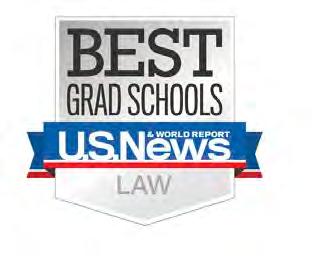
Established in 2022, byu Law’s Global Business Law Program focuses on designing legal solutions for the most challenging problems in the modern economy. The program facilitates new events, research, and cross-border engagement to foster partnerships and best practices for policy in developing markets. It also offers an innovative curriculum for training the next generation of corporate lawyers, regulatory attorneys, and litigators. Courses cover the key pillars of business law, immersive simulations, and off-site academies and externships in New York, the Bay Area, Houston, London, and Dubai. The program’s first initiative, the Future of Antitrust Series, provides a forum for collaboration and constructive debate for those advancing the next generation of antitrust policy around the world. The series received an unrestricted $500,000 grant from Amazon.com that provides funding for conferences and webinars, research fellows and assistants, and proprietary data to be used for empirical research. #22
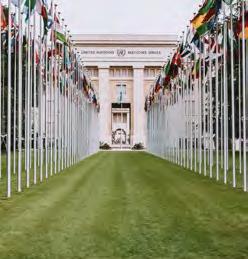
A 60,000-square-foot addition in 1997 transformed the library into one of the most functional and best-equipped academic law libraries in the nation.

Redesigned in 2020, the new space includes an office for each career advisor, allowing for more personal support for students.

This comfortable space for students to relax and socialize was completed in January 2019.

A comprehensive renovation was completed in November 2019. As part of the effort to bring light into the school, the room gained a skylight that arches across nearly its full expanse. The Moot Courtroom now serves as both an instruction space and a gathering place for forums and conferences.
 W. Hunter Law Library
Stephanie S. and John L. Sorensen Student Commons
Anderson Moot Courtroom
W. Hunter Law Library
Stephanie S. and John L. Sorensen Student Commons
Anderson Moot Courtroom

Dedicated on October 22, 2014, the new lounge was part of Dean James R. Rasband’s campaign to “bring light to the law building” and provide space for both large receptions and smaller student gatherings.
Completed in 2021 as part of the Legal Technology Initiative, this spacious, high-tech room can be set up for large lectures or as a collaborative classroom for design-thinking and problem-solving instruction.

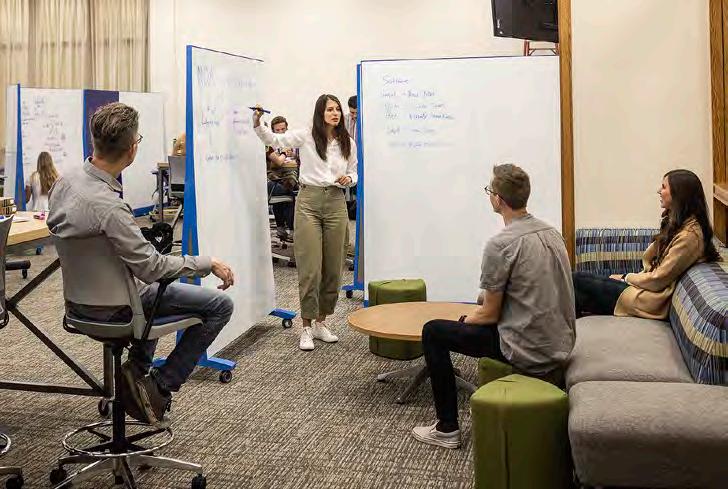
Communications Suite
Offices for the communications team and registrar were completed in December 2021.




in the fall of 2013, byu Law dean James R . Rasband created the Law School Art Committee and gave its members a mandate to beautify the law building. This directive, coupled with Dean Rasband’s concurrent initiative to increase natural light through major renovations, transformed the interior of the building. Over the past 20 years, byu Law has acquired 179 works of art, and alumni have donated many of these pieces. Each artwork has a distinct connection with the Law School and its history.
The most recent addition is an original oil-on-canvas, seven-panel polyptych by renowned artist Jorge Cocco. The panels are displayed outside the Guy Anderson Moot Courtroom and depict seven roles of Jesus Christ as identified in the Law School’s mission statement, which reads in part:
We are committed to the teachings of Jesus Christ and honor His many roles, including healer, mediator, counselor, peacemaker, advocate, lawgiver, and judge. In striving to emulate His example, we seek to be and develop people of integrity who combine faith and intellect in lifelong service to God and neighbor.



The p olyptych by Cocco—who paints in a style he calls “sacrocubism” because of its sacred themes and cubist influence—was commissioned for the Law School building by alumnus Jared Sine, ’07, and his wife, Ruth. Announcing the unveiling of the polyptych at the Law School, dean D. Gordon Smith remarked, “We are elated to have Cocco’s vibrant and inspiring artwork on permanent and prominent display at the Law School. It is particularly gratifying that one of our graduates has enabled this powerful reminder to follow the Savior in ways that amplify the Law School’s mission.”


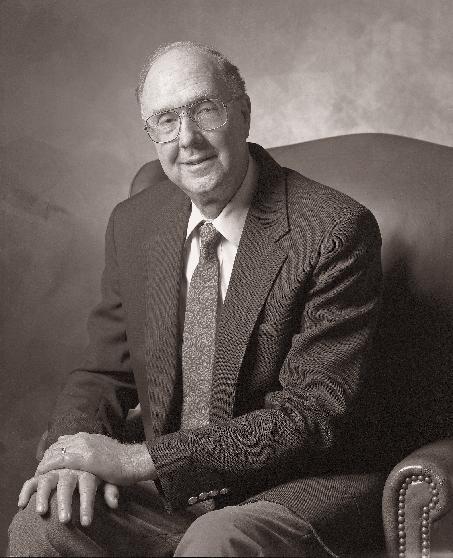
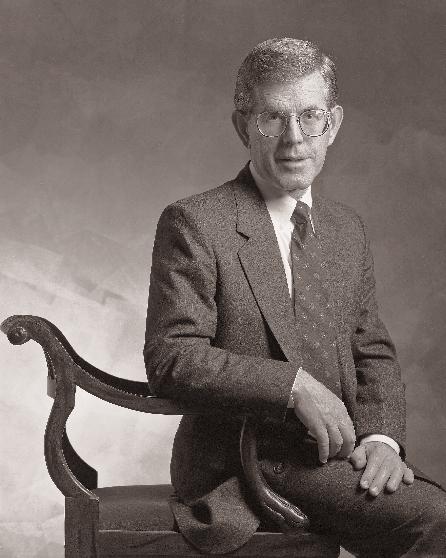

bruce
1985–1989 h.
kevin j worthen

2004–2008
james d. gordon iii ..............................
2008–2009 (INTERIM DEAN)

james r. rasband ..............................
2009–2016
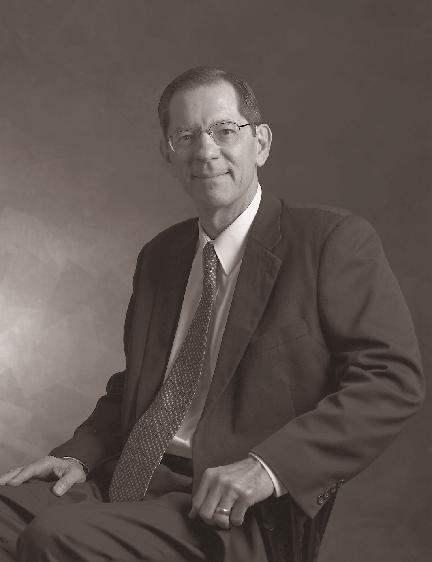


professor j . clifton fleming jr . is the only still-serving member of the Law School’s original faculty. His decades of influence as an educator, mentor, and taxation scholar have been integral to byu Law’s extraordinary success.
Under the deanships of Bruce C. Hafen and H. Reese Hansen, Fleming served as associate dean for academic affairs from 1986 to 1999 and then as associate dean for faculty and curriculum from 1999 to 2004. Fleming’s 1998 appointment to the prestigious Ernest L. Wilkinson Chair honored his scholarship and dedication to academic excellence throughout what even 25 years ago was a long tenure at byu Law.
Beyond byu, Fleming’s academic and teaching career has spanned the globe. He was a Fulbright visiting professor of law at the University of Nairobi (1977–78) and a visiting professor at the University of Queensland (1997, 1999), Central European University in Budapest (2001–20), the
University of Florida Levin College of Law (2002), and Murdoch University School of Law in Perth (2008). In 2011, he held the Fulbright Distinguished Chair at the Vienna University of Economics and Business in Austria. To put it mildly, Professor Fleming is a dynamo.
In his Seattle law practice, Fleming handled complex corporate deals, business formations, and high-net-worth estate plans. “It was exhilarating to sit down with clients who were significantly wealthier and older than me, and yet they listened attentively to my advice, taking it seriously,” he says. “As a relatively young person, it was quite an adrenaline rush to witness their nodding approval. I relished the challenges and the connections with my clients.” Yet, as much as he enjoyed private practice, the prospect of trying something new was compelling. “I found myself deeply fascinated by tax law and I thoroughly enjoyed sharing my knowledge with others.
I decided to embark on a new venture and see how it would turn out.” Fleming began teaching at University of Puget Sound School of Law (now Seattle University School of Law). Teaching was a good fit.
Shor tly after his transition to academia, approval for a law school at byu was announced. Fleming was one of very few Latter-day Saint law professors at the time, and he recognized the potential for byu Law to become a unique institution, wielding national and international influence while also supporting the worldwide mission of The Church of Jesus Christ of Latter-day Saints. He was in. Five decades later, he’s still in.
At byu Law, Fleming’s teaching repertoire includes Federal Income Taxation, International Income Taxation, European Union Law, and Corporate Taxation. His enthusiasm for these subjects is palpable and his ability to communicate complex legal principles clearly is legendary. Fleming sparks his students’ intellectual curiosity by emphasizing critical thinking and ethical values in his teaching. He has mentored and counseled countless students in their aspirations to secure stable jobs, support their families, and make a difference in the world. It’s no wonder students love him. Fleming reflects, “The love of teaching has been a guiding force throughout my career. It has allowed me to connect with students on a deeper level and witness their growth and quest for knowledge, and students inspire me to continuously explore and evolve as an educator.” While teaching in Budapest, Hungary, a student approached him with a question after class. Although Fleming provided the orthodox answer, he felt that it wasn’t entirely satisfying to the student or himself. He contemplated the issue for several years before arriving at a profound insight. “This newfound understanding inspired me to write a law review article, and the experience exemplifies how faculty members can learn and grow through interactions with students,” he says.
Fl eming’s dedication to his students goes beyond preparing them for successful
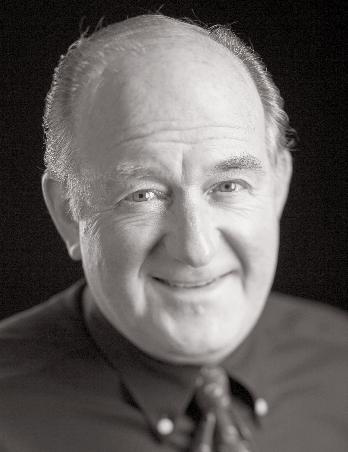
careers; he is equally passionate about guiding them toward fulfilling, purposeful lives. “I strongly encourage students to seek the guidance of their Heavenly Father in making career choices,” he says.
During the past 50 years, Fleming has witnessed considerable change at byu Law. One of the many positive developments has been the dramatic increase in female students and faculty members. “As the percentage of female students grew from a mere 7 percent in the early years to about 50 p ercent in recent times, the curriculum has evolved accordingly,” he says. “With this growth, we have introduced courses that address relational, family, gender, and race matters, expanding beyond traditional areas like business and commerce. The presence and influence of women has been a catalyst for progress, leading to a richer and more diverse learning environment that benefits the entire law school community.”
The Law School has also significantly broadened its range of experiential learning courses. “Back in the 1970s, we were just beginning to explore the potential of hands-on learning, and we have made tremendous strides in perfecting our approach,” Fleming observes. The opportunities available to byu Law students today are focused not only on traditional subjects like appellate practice and corporate litigation but also on niche areas such as immigration and international commercial arbitration. Fleming thinks the increased emphasis on experiential learning has been a critical, positive change and claims that it reflects “byu Law’s commitment to producing well-rounded and prepared legal professionals.”
One of the most remarkable evolutions during Fleming’s long tenure has been the integration of technology with law. The way legal research is conducted and how information is stored and shared has completely transformed over time. Fleming has adapted with legal technology’s quantum leaps and
incremental shifts, and he knows how to tap the right resources to do so. “Understanding how to effectively collaborate with technology specialists is a vital aspect of modern legal practice,” he says. “The challenge has always been for lawyers to keep up with the ever-changing legal environment and adapt to the growing demands of the profession. It has been a matter of finding the right balance between being proficient technology consumers and recognizing when to collaborate with technology experts. Embracing this change has been integral to staying relevant and effective in the modern legal landscape.”
According to Fleming, we can expect an increasingly intricate and regulated legal landscape. “The rise of generative AI and technology is set to reshape the legal profession significantly,” Fleming says. “While certain repetitive tasks may be automated, there will be a growing demand for legal professionals who excel in highly specialized and creative work that AI cannot replicate. To remain relevant, future lawyers will need to excel at critical thinking and offer analytical skills, creativity, and an understanding of the law’s increasingly complex regulatory framework. It will be imperative to nurture these qualities in students, preparing them to tackle complex legal issues that demand human ingenuity.”
Over the past five decades, Fleming has worked with nine different deans, and he appreciates the distinct role of each dean in the Law School’s history. “Throughout the years, our deans have demonstrated unwavering dedication to crafting an outstanding law school,” he says. “Leading the Law School has required a multifaceted approach in order to secure financial resources, recruit top-notch faculty who meet byu’s high standards, and motivate faculty to be productive scholars who elevate byu’s reputation globally. Each of the Law School’s deans has fully grasped and embraced this vision, consistently steering the Law School towards excellence.”
Relationships with colleagues, including Law School deans, have been a meaningful
source of inspiration for Fleming. “I’ve had the privilege of learning and gaining valuable insights from numerous esteemed colleagues. Their knowledge and expertise have been invaluable to my growth and development,” Fleming shares. “As an associate dean, I collaborated with Reese Hansen for a span of 18 years. During three of those years, we both served as associate deans under Bruce Hafen’s leadership. When Reese assumed the role of dean, I chose to continue working alongside him for another 15 years. As a result, we formed a long-standing professional relationship. Although Reese has been retired for quite some time now, our bond remains a cherished and significant part of my career.”
As he looks to the future, Fleming eagerly anticipates returning to the classroom for another engaging academic year. “I find immense satisfaction in what I do, and as long as it remains interesting and enjoyable, I intend to continue teaching and writing about tax law. Each passing year, I resubscribe to the illusion that I am getting better at my craft, and this motivates me to persist until my body inevitably asks for a slowdown and I will have to explore new ventures.”
Fleming remains dedicated to educating future lawyers at byu Law. Reflecting on the Law School’s history, he recalls its auspicious beginnings with a young and ambitious faculty brimming with intelligence and energy: “ byu Law has evolved from a fledgling law school to a distinguished institution, firmly positioned among the nation’s top 25 law schools. Throughout this remarkable growth, we have learned the significance of patience and steadfast dedication to the fundamentals. This mindset has been vital in shaping our path towards success.”
As we celebrate the 50th anniversary of byu Law School, it is only fitting to pay tribute to a pillar of its success, Professor J. Clifton Fleming Jr. His exceptional contributions enrich legal education and inform a legacy that will continue to shape the lives and careers of future legal scholars and practitioners.
some say you can’t go home again, but Shima Baradaran Baughman, ’04, has. After teaching for 10 years at the University of Utah, Baughman has recently returned to byu Law as a top-cited criminal law scholar and a nationally recognized expert on bail reform. She is proud to be back at byu Law as the Woodruff J. Deem Professor of Law and a Distinguished Fellow at the Wheatley Institute.
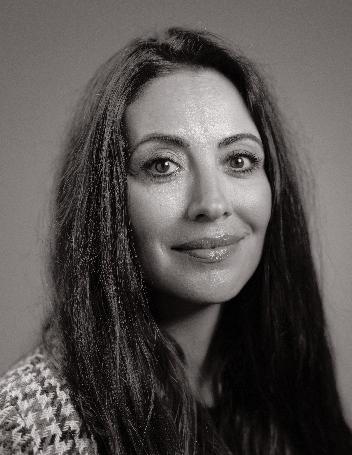
When she was seven years old, Baughman and her family moved from Iran to the United States, seeking refuge and a better life. She explains, “My mother was a political activist in Iran, and she was incarcerated for seeking a change in government leadership to allow for freedoms of speech and religion. In the United States, political speech is a protected right.” Baughman’s deep appreciation for the freedoms and opportunities in the United States inspires her to make the US legal system more equitable. She warns, “We should carefully examine the rights of
those who are incarcerated to ensure that their rights are respected.”
Baughman graduated first in her class from byu Law in 2004 and clerked for Judge Jay S. Bybee of the US Court of Appeals for the Ninth Circuit, after which she began her legal career as a litigator at Kirkland & Ellis llp in New York. She worked on several pro bono appeals for criminal defendants. “During my first three years of practice, the bulk of my pro bono hours were spent litigating a case against the Federal Bureau of Prisons. The bureau failed to accommodate my client, a Hasidic Jewish rabbi who was unable to pray in a clean place in his prison cell,” Baughman recounts. “I loved working to establish my client’s right to free exercise of religion because faith and worship are both so integral and personal to my own family.”
After leaving private practice, Baughman turned to criminal justice reform and took a Fulbright Senior Fellowship at the University of Malawi, where she researched pretrial detention and lectured on criminal law. “I witnessed the dire conditions of pretrial detention, and that exposure ignited my passion for bail reform,” she says. “I delved wholeheartedly into studying the issue, driven by a profound motivation to reduce mass incarceration and support criminal defendants.”
Baughman began her teaching career at byu Law in 2010 and was voted Professor of the Year. In 2013 she joined the faculty at the University of Utah S.J. Quinney College of Law, where she also served as the associate dean of faculty research and development. “A joy during my career as a law professor has been mentoring incredibly bright students and seeing how much they accomplish,” she says. “Many of my students have gone on to achieve remarkable success as judges, Supreme Court clerks, law professors, and public servants.”
Baughman’s research explores critical topics including bail reform, racial bias in prosecutorial decision-making, and the impact of forgiveness and religion on criminal justice. One of her groundbreaking works, The Bail Book: A Comprehensive Look at Bail in America’s Criminal Justice System, was published by Cambridge University
Press in 2018 and provides a comprehensive examination of the intricacies and challenges of the bail system. The Bail Book is recognized as a significant contribution to the understanding of pretrial detention and its implications on mass incarceration. Beyond her teaching and scholarship, Baughman has chaired the aba Pretrial Justice Taskforce and served as a member of the Utah Sentencing Commission, showing her unwavering dedication to effecting change at a policy level.
Baughman emphasizes the integration of faith-based principles with legal advocacy in her professional endeavors. “I have felt called to improve the justice system and the lives of those caught up in it,” she shares. “A changed heart is a more powerful agent for change than punishment. Deep-rooted individual change can help solve the most difficult social problems.”
H er dedication to making a positive impact on society and promoting justice helps to fulfill byu Law’s mission to recognize “the inherent dignity and equality of each individual” and advance “justice, mercy, liberty, opportunity, peace, and the rule of law.” Baughman reflects, “Incarceration is just a symptom of larger societal problems. Our society must demand a broader approach to healing. Through lasting change, mercy, and redemption, inspired by Christian principles, true transformation in criminal justice can be achieved. My eyes are now opened to a new path—one that draws upon faith-based solutions to harmonize the pursuit of justice and healing in a profound and compassionate manner.”
Baughman’s byu Law homecoming is a return to familiar ground where her faith and legal scholarship first converged, and her enthusiasm for both the pursuit of justice and spiritual fulfillment will foster a learning environment where byu Law students can thrive. “byu’s emphasis on faith in Jesus Christ influenced my decision to return to byu Law and the Wheatley Institute,” she says. “I am delighted to share a common faith with my students and colleagues, and I look forward to fostering unity and camaraderie as we work towards the goals of this Zion University.”
woman from India right after my sophomore year of college. This year, Lakshmi and I will be celebrating our 50th anniversary along with byu Law School’s!
Moreover, what neither my fellow Berkeleyans nor I could have anticipated was the empathy my new byu colleagues had for me and I for them. The law faculty identified with my sense of adventure and my willingness to be “a stranger in a strange land” (Exodus 2:22). They too had left behind professional lives in cosmopolitan settings as esteemed legal scholars and attorneys. Instead of playing it safe, we each took a major risk, consistent with our Christian faith, to pioneer a school of legal education at byu with goals of providing exemplary teaching and of edifying students’ faith in the unconditional love of our Savior.
I felt instant kinship with professors and students alike. I met people who were also
it was 1989 when I received an offer to join the byu Law faculty. At the time, I was a successful trial attorney, Evangelical leader, and Chicano activist living in Berkeley, California. When I told my friends that I intended to accept the offer and become J. Reuben Clark Law School’s first professor of color, they were incredulous: “You can’t be serious. You will dry up and die on the vine,” they said. “Did you know that the farthest away you can get from the San Francisco Bay Area and not leave the United States is Utah County? You will not last six months.”
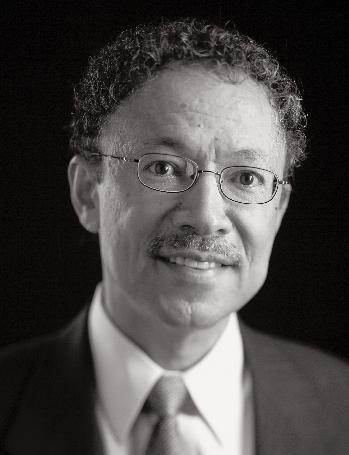
My dear friends from the Bay Area were mistaken about my future in Provo. They had no idea how much my Christian faith compels me to take chances and trust God’s hand in my life. At 18 years old, I was struggling to survive the violent gangs and avoid the rampant drugs in inner-city Los Angeles. I was wholly unprepared for college. Yet off I went to Yale University, where I ended up graduating with honors. At age 20, I took an even greater risk and married a young
pushed outside the circle of social acceptability—fellow Christians who also knew firsthand the sting of bigotry, persecution, and ridicule. (I confess my own complicity; I pride myself in keeping up with the latest name or pronoun by which a person identifies, but I still slip up and use “Mormon” when referring to members of The Church of Jesus Christ of Latter-day Saints.)
This bond of empathy was most striking in our creative approach to cultural diversity. We Berkeley-types add up victim points, depending upon how much someone has suffered on account of gender, race, color, language, religion, age, sexuality, physical or mental disability, or other identity markers. We then justify special treatment and compensation based on the number of “points.” At byu Law School, we too factor in long histories of invidious exclusion, but we chose to embark on a quest for equity and inclusion that went the extra mile. In effect, we “baptized” multiculturalism.
Working together, we reframed what could be intensely political and divisive into something spiritual and unifying. We essentially invited everyone in our community to act on the shared belief that every person is a child of God who holds a spark of His divinity within them.
To turn this aspiration into a day-today reality, we needed to take risks with our curriculum and social activities. To this end, the faculty developed a robust offering of clinical and problem-solving courses in mediation, negotiation, appropriate dispute resolution, interviewing, and counseling. We also created new courses such as the Community Lawyering class I taught. These courses taught students that it is not enough to “think like a lawyer.” It is not enough to settle for analytical excellence, forceful presentation, unquestioned ethics, undeniable competency, or other traditional signifiers of first-rate legal training; byu law students must also practice Christian disciplines. Practices such as reconciliation and peacemaking save relationships and prevent legal problems in the first place, even among strangers and enemies.
Outs ide of class, we reinforced our academic and clinical training through extracurricular activities (Discovery Weeks, we called them) to increase opportunities for faculty and students to learn how to embrace a variety of cultural and religious backgrounds. We staged major communitybuilding events, wore T-shirts, invited guest speakers, and even sang and danced together. (I’m remembering a dean’s version of ymca and the Macarena and a few professors dressed up like gumshoes during Sherlock Holmes Week.)
After 25 years of teaching at byu Law School, I am still a Berkeley guy at heart. Still a mainstream Christian. Still a Chicano activist. Not a day goes by without me being stretched way outside my comfort zone. So when am I going back home to the Bay Area? I am home in Utah County, thanks to the courageous brothers and sisters at byu Law School who were unafraid to love the stranger.
Here’s to 50 years of rock-solid faith in the saving sacrifice of Jesus Christ!
byu Law continues to build a community of students, faculty, and alumni who are committed to redressing social injustice. Through clinics, fellowships, and volunteer programs, byu Law students implement classroom learning to improve their community. At the South Texas Family Residential Center, student volunteers for the Refugee and Immigration Initiative assist women and children who are seeking asylum. byu Law’s curriculum emphasizes public service, equality, and justice in courses on family law, immigration law, immigration asylum, law and public education, civil rights, and international human rights. Other offerings, such as the legal design lab LawX, give students hands-on experience helping people navigate the justice system.
The Global Business Law Program is focused on developing legal solutions for the modern economy’s most difficult challenges by facilitating research and policy engagement on topics of interest to the international business community. This innovative curriculum includes Global Law Seminars in London, Geneva, and Dubai in which students take international business law courses while completing externships with global organizations and multinational law firms. A $500,000 unrestricted grant from Amazon.com funded the program’s Future of Antitrust Initiative in 2022. Policymakers, academics, and thought leaders gathered at a series of conferences in Washington, DC, and Brussels to develop the next generation of antitrust policy in the US, Europe, and beyond.
byu Law’s International Center for Law and Religion Studies (iclrs) is a recognized leader in the area of religious rights, both in the US and internationally. The Center’s domestic work has included giving congressional testimony, contributing to amicus briefs on constitutional issues, and hosting the annual International Law and Religion Symposium. iclrs has influenced constitutional and legislative reform in more than 50 countries, and it organizes and participates in many international regional conferences and law reform consultations annually. More than 75 byu Law students are involved in the Center’s legal research and symposia each year. The Center also sponsors 15 law student fellowships for work on religion-related projects on topics such as land purchase and zoning, organizational and associational rights, and employment concerns.
The Law School hosts a Law, Entrepreneurship, and Innovation Summit for law and business leaders in addition to colloquia for law school academics on tax policy, intellectual property, and entrepreneurship. At the annual Winter Deals Conference, legal scholars, policymakers, and practitioners who specialize in areas such as mergers and acquisitions, securities, and venture capital gather to discuss the modern global economy’s most pressing legal issues. In addition to its academic leadership, byu Law also offers the Law and Entrepreneurship Clinic for students to gain experience with intellectual property protection, business formation, terms of use and privacy policies, investment documents, and commercial contracts.
LawX, byu Law’s legal design lab, offers a design-thinking course in which students are given one semester to solve an access-to-justice problem. Students research, ideate, prototype, and test solutions, with deadlines and responsibilities akin to being in a startup business. LawX projects have generated many successful technology-based legal solutions: SoloSuit helps individuals fight debt collections in court without a lawyer, HelloLandlord improves landlord-tenant communication, and Goodbye Record facilitates the expungement process.
byu Law clinics provide opportunities for students to work under the supervision of professors and practitioners to represent clients in civil disputes concerning contracts, employment, and housing and in criminal matters involving expungement and immigration. Clinic offerings vary from year to year.
Through byu’s Center for Peace and Conflict Resolution, students assist in resolving campus conflicts and promoting peace through mediation, arbitration, training workshops, and client consultations.
International opportunities are an integral part of the byu Law experience, and more than a third of students participate in international externships each year. Students are placed with US government offices, the United Nations, and international human rights, humanitarian, and international trade offices in Geneva. These unique international experiences open doors for students to pursue local and global opportunities in the future. byu Law graduates benefit from a consistent pipeline into US government jobs including the Judge Advocate General’s Corps, international law firms, and nongovernmental organizations.
Saint
to provide full-service, pro bono legal services for those who cannot afford legal representation.
Supreme Court Advocacy Clinic participants research legal issues and draft court briefs for professors and renowned appellate litigators who are working on future US Supreme Court cases.
The Domestic Violence Intervention Clinic exposes byu Law students to victim issues in criminal, family law, and personal injury cases. The clinic offers experience with protective orders and juvenile court. Students work directly with attorneys to advise clients, provide referrals, prepare documents, and attend mediations for survivors of domestic violence and sexual assault.
Law students in the Law and Entrepreneurship Clinic work with experienced lawyers to represent startup companies, entrepreneurs, and nonprofit organizations on matters ranging from incorporation to intellectual property to employment issues.
The Mediation Clinic develops students’ professional abilities in counseling, interviewing, negotiation, mediation, and problem-solving as they assist litigants in small claims courts and other venues. Students learn these skills in weekly classes on advanced mediation techniques and ethics.
Students participating in the Criminal and Civil Rights Appeals Clinic assist clients with criminal and civil rights appeals under the supervision of seasoned practitioners, gaining practical experience with writing briefs and delivering oral argument.
In the Family Law Clinic, law students learn divorce processes and procedures as they work under practitioner supervision to assist low-income clients involved in divorce or custody cases.
The Legislative Clinic allows students to help shape public policy by advising constituents and legislators, drafting proposed legislation, presenting testimony, and preparing legislators to introduce bills in the general session of the Utah State Legislature.
Law students participating in the Negotiation and Conflict Resolution Clinic gain a greater understanding of conflict transformation and cultivate negotiation skills by working with clients to assess conflict-management needs and design dispute-resolution systems.
